Tackle social anxiety head-on with these brain-boosting games. Try jigsaw puzzles for a calming focus, or challenge your logic with Sudoku. Crosswords can expand your vocabulary, while memory games sharpen recall skills. Word searches offer a soothing distraction, and mastering the Rubik's Cube builds problem-solving prowess. Chess improves strategic thinking, and trivia games boost confidence through knowledge. Escape room challenges foster teamwork in a structured setting. Finally, use conversation starters to ease into social interactions. By engaging in these activities regularly, you'll develop cognitive skills that can help you navigate social situations with greater ease. Discover how each game uniquely contributes to conquering your anxiety.
Jigsaw Puzzles
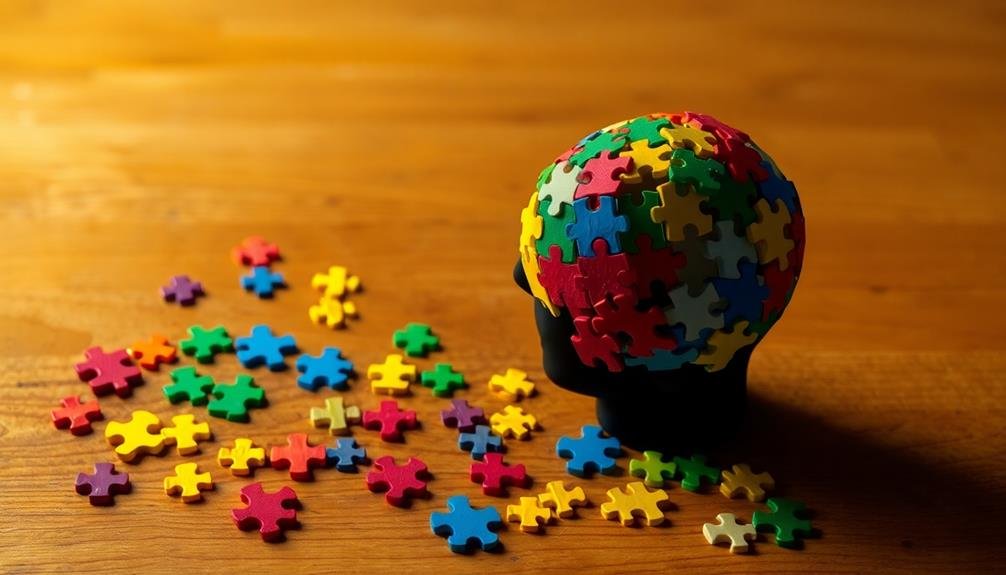
Jigsaw puzzles piece together a perfect solution for those grappling with social anxiety. They offer a calming, focused activity that engages your mind and reduces stress. As you search for the right pieces, you'll find your thoughts shifting away from social worries and onto the task at hand.
These puzzles improve your problem-solving skills and boost your confidence. You'll learn to approach challenges methodically, breaking them down into manageable parts. This skill transfers to social situations, helping you tackle interactions step-by-step.
Working on jigsaw puzzles can also be a social activity. Invite a friend or family member to join you, creating a low-pressure environment for interaction. You'll have a shared goal and a natural conversation starter, easing social tension.
Regular puzzle-solving enhances your visual-spatial reasoning and short-term memory. These cognitive improvements can make you feel more mentally sharp and prepared for social encounters. You'll also experience a sense of accomplishment with each completed puzzle, reinforcing positive feelings about your abilities.
Start with smaller puzzles and gradually increase the difficulty. You'll find that as your puzzle-solving skills grow, so does your ability to navigate social challenges.
Sudoku
Sudoku can greatly improve your concentration and focus, helping you stay present and less anxious in social situations.
As you tackle these number puzzles, you'll enhance your problem-solving skills, which can boost your confidence in maneuvering social challenges.
Additionally, the meditative nature of Sudoku can reduce your stress levels, providing a calming effect that may carry over into your social interactions.
Improves Concentration and Focus
Among the most effective brain-boosting games for improving concentration and focus, Sudoku stands out as a powerhouse. When you engage in this number-placement puzzle, you're training your brain to maintain intense focus for extended periods. This skill directly translates to managing social anxiety, as you'll find it easier to stay present in conversations and social situations.
Sudoku challenges you to fill a 9×9 grid with digits so that each column, row, and 3×3 sub-grid contains all numbers from 1 to 9. As you solve these puzzles, you're developing your ability to filter out distractions and concentrate on the task at hand. This improved focus can help you navigate social interactions more confidently, allowing you to tune out negative thoughts and external pressures.
Regular Sudoku practice enhances your working memory and cognitive flexibility. You'll notice improvements in your ability to process information quickly and make decisions under pressure.
These skills are invaluable when dealing with social anxiety, as they empower you to respond more effectively in social situations. By sharpening your concentration through Sudoku, you're equipping yourself with a powerful tool to overcome social anxiety and engage more confidently with others.
Enhances Problem-Solving Skills
How does Sudoku enhance your problem-solving skills? This classic number puzzle game challenges you to fill a 9×9 grid with digits so that each column, row, and 3×3 sub-grid contains all numbers from 1 to 9.
As you engage with Sudoku regularly, you'll develop critical thinking abilities that can help you tackle social anxiety-inducing situations more effectively.
Sudoku improves your problem-solving skills in several ways:
- Logical reasoning: You'll learn to analyze patterns and make deductions based on available information, helping you approach social scenarios more rationally.
- Patience and persistence: Solving difficult puzzles teaches you to stay calm and persevere, skills that are invaluable when facing anxiety-provoking social situations.
- Decision-making: You'll become adept at weighing options and making choices quickly, which can boost your confidence in social interactions.
Reduces Stress Levels
One of the most significant benefits of playing Sudoku is its ability to reduce stress levels. As you focus on filling in the numbers and solving the puzzle, your mind shifts away from anxiety-inducing thoughts and concentrates on the task at hand. This mental shift can provide a much-needed break from the constant worry that often accompanies social anxiety.
Sudoku's structured nature and clear rules offer a sense of control and predictability, which can be comforting when you're feeling overwhelmed by social situations. The game's logical progression allows you to experience small victories as you complete each section, boosting your confidence and reducing overall stress.
Moreover, the repetitive nature of Sudoku can induce a meditative state, promoting relaxation and mindfulness. As you engage with the puzzle, you'll likely notice your breathing becoming more regulated and your muscles relaxing.
This calming effect can extend beyond your gaming session, helping you approach social interactions with a more relaxed mindset.
Crossword Puzzles
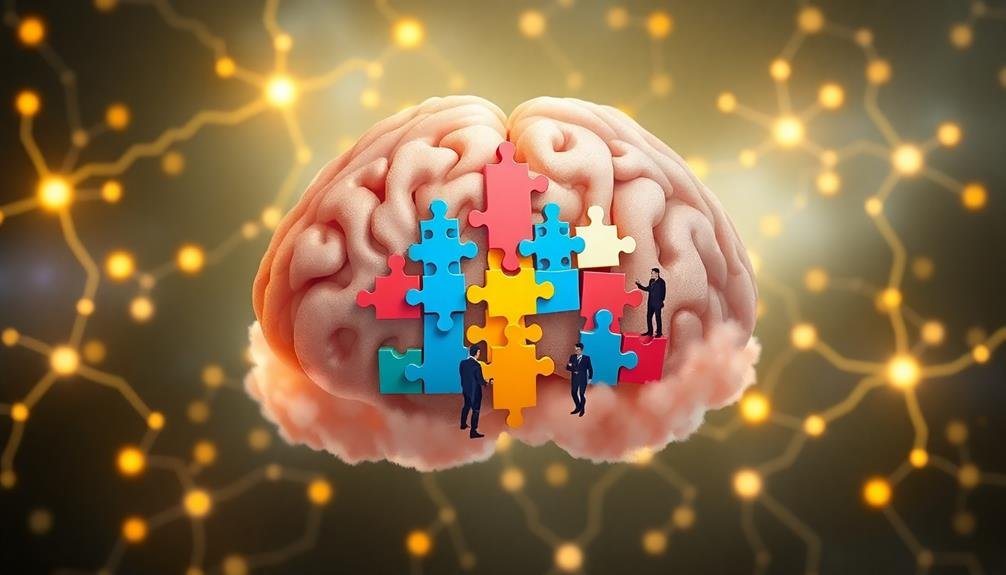
Crossword puzzles offer you a unique opportunity to expand your vocabulary, potentially boosting your confidence in social situations.
As you tackle these word games, you're practicing cognitive flexibility, which can help you adapt more easily to unexpected social scenarios.
Additionally, the diverse topics covered in crosswords can provide you with interesting conversation starters, making it easier to engage in small talk with others.
Vocabulary Expansion Benefits
Why might crossword puzzles be particularly beneficial for those with social anxiety? One key advantage is their ability to expand your vocabulary, which can greatly boost your confidence in social situations. As you solve clues and fill in words, you're constantly encountering new terms and reinforcing your knowledge of existing ones.
This vocabulary expansion offers several benefits for managing social anxiety:
- Improved communication skills: A broader vocabulary allows you to express yourself more precisely, reducing the fear of being misunderstood or struggling to find the right words.
- Enhanced conversation starters: Knowledge of diverse topics and interesting words can help you initiate and maintain engaging conversations, easing social interactions.
- Increased self-assurance: Feeling more articulate can boost your overall confidence, making social situations less intimidating.
Cognitive Flexibility Practice
Beyond expanding your vocabulary, crossword puzzles offer another significant benefit for those with social anxiety: they're an excellent way to practice cognitive flexibility. This skill involves adapting your thinking to new situations and shifting between different concepts or perspectives.
When you tackle a crossword puzzle, you're constantly challenged to think from various angles. You'll encounter clues that require wordplay, puns, or lateral thinking. This mental agility can translate directly to social situations, helping you navigate conversations more smoothly and respond to unexpected topics or changes in social dynamics.
As you solve puzzles, you're training your brain to evaluate multiple possibilities for each answer. This practice can reduce rigid thinking patterns often associated with social anxiety. You'll become more adept at generating alternative solutions to social challenges and interpreting social cues from different perspectives.
Moreover, the process of revising your answers as you gather more information from intersecting clues mimics the way you might adjust your understanding of social situations as you gain more context. This adaptability can boost your confidence in social settings, making interactions feel less intimidating and more manageable.
Social Conversation Starters
While many people overlook this benefit, crossword puzzles can serve as excellent conversation starters in social situations. They're not just brain teasers; they're windows into diverse topics that can spark engaging discussions.
When you're feeling anxious in social settings, having a crossword puzzle handy can provide a natural way to break the ice and connect with others.
Here's how crossword puzzles can boost your social confidence:
- Shared problem-solving: Invite others to help you solve clues, creating a collaborative atmosphere that eases tension.
- Topic exploration: Use interesting clues as jumping-off points for deeper conversations about history, pop culture, or current events.
- Humor opportunities: Laugh together over particularly clever or punny clues, fostering a lighthearted mood.
Memory Games
Memory games offer a dual benefit for those with social anxiety. They not only sharpen your cognitive skills but also provide a fun way to engage with others in a low-pressure environment. By improving your memory, you'll feel more confident in social situations, remembering names, faces, and details about people you meet.
Try classic games like "Simon Says" or "Memory" with a group of friends. These games challenge your recall abilities while fostering a lighthearted atmosphere. For a modern twist, explore brain-training apps that focus on memory exercises. You can compete with friends or join online communities to track your progress.
Another effective memory game is "Person-Action-Object." In this game, you'll create a story using three random words, linking them together in a memorable way. This exercise enhances your ability to form quick associations, which can be invaluable during conversations.
Don't forget about word-based memory games like "Categories" or "I'm Going on a Picnic." These games improve your verbal recall and can help you feel more at ease when engaging in small talk or group discussions.
Word Search
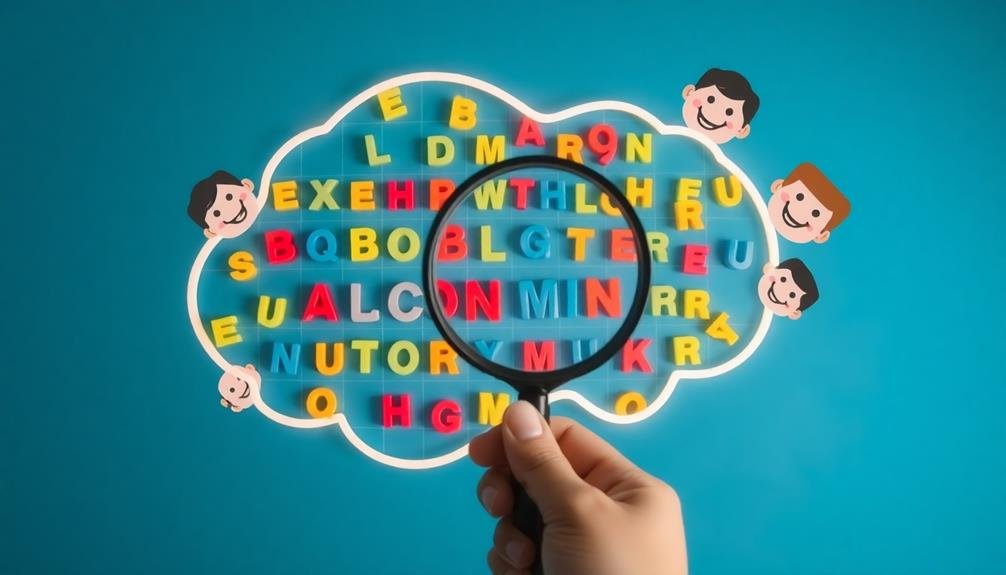
Word search puzzles offer a calming yet engaging activity for those with social anxiety. As you scan the grid for hidden words, you'll find your mind focusing on the task at hand, temporarily shifting attention away from anxious thoughts.
This simple yet effective game can help you develop better concentration skills, which may prove useful in social situations where maintaining focus is essential.
Word searches can also expand your vocabulary, boosting your confidence in conversations. As you encounter unfamiliar words, take a moment to look up their meanings. This practice can enhance your language skills and provide interesting topics for small talk.
To maximize the benefits of word searches for social anxiety:
- Set a daily goal to complete one puzzle, gradually increasing difficulty
- Challenge yourself to find words related to social situations or positive emotions
- Use themed puzzles that align with your interests, making it easier to discuss topics you enjoy
Logic Puzzles
Logic puzzles can be powerful tools to sharpen your critical thinking skills while tackling social anxiety.
As you work through these brain teasers, you'll strengthen your ability to analyze complex situations and find innovative solutions.
Sharpen Critical Thinking Skills
Challenging your mind with logic puzzles can greatly enhance your critical thinking skills, providing a powerful tool for managing social anxiety. By regularly engaging in these mental exercises, you'll develop the ability to analyze situations more objectively and find creative solutions to problems. This newfound confidence can help you navigate social interactions with greater ease and less stress.
To sharpen your critical thinking skills through logic puzzles, consider these strategies:
- Start with simpler puzzles and gradually increase difficulty
- Time yourself to improve problem-solving speed
- Analyze your thought process after solving each puzzle
As you progress, you'll notice improvements in your ability to break down complex situations, identify patterns, and make logical deductions.
These skills directly translate to social scenarios, helping you better understand social cues, anticipate others' reactions, and respond appropriately. You'll find yourself better equipped to handle unexpected social challenges and less likely to be overwhelmed by anxiety-inducing situations.
Build Problem-Solving Confidence
While critical thinking skills lay the groundwork, engaging in logic puzzles specifically geared towards problem-solving can greatly boost your confidence in social situations.
These puzzles challenge you to think outside the box, develop step-by-step strategies, and arrive at solutions through deductive reasoning.
Start with classic logic games like Sudoku or crossword puzzles, which train your brain to spot patterns and make connections.
As you progress, tackle more complex challenges like cryptograms or lateral thinking puzzles. These games simulate real-life problem-solving scenarios, helping you approach social situations with a calm, analytical mindset.
Try incorporating interactive puzzle games into your routine.
Apps like "Lumosity" or "Peak" offer daily brain training exercises that target problem-solving skills.
Rubik's Cube

The colorful puzzle cube invented by Ernő Rubik offers more than just a fun challenge; it's a powerful tool for managing social anxiety. As you focus on solving the cube, your mind shifts away from anxious thoughts, allowing you to enter a state of flow. This mindful engagement can help reduce stress and boost your confidence in social situations.
Mastering the Rubik's Cube can improve your cognitive abilities in several ways:
- Spatial awareness: Manipulating the cube enhances your ability to visualize and understand three-dimensional objects, which can translate to better navigation in social spaces.
- Problem-solving skills: Learning algorithms and developing strategies to solve the cube strengthens your analytical thinking, helping you approach social challenges more effectively.
- Memory enhancement: Remembering move sequences exercises your working memory, potentially improving your ability to recall names and details during conversations.
Chess
Chess, the ancient game of strategy, frequently serves as a powerful tool for combating social anxiety. When you engage in chess, you're forced to focus intensely on the board, your opponent's moves, and your own strategy. This concentration can help divert your mind from anxious thoughts and social pressures.
Playing chess also improves your cognitive abilities, boosting your confidence in social situations. As you learn to anticipate your opponent's moves, you're developing critical thinking skills that can translate to better social interactions. You'll find yourself better equipped to read social cues and respond appropriately.
Chess tournaments and clubs provide a structured environment for social interaction. You'll meet like-minded individuals in a setting where the focus is on the game, not on small talk. This can ease the pressure of socializing while still allowing you to build connections.
Moreover, chess teaches you to handle both victory and defeat gracefully. This resilience can help you navigate social situations with more ease, knowing that not every interaction will be perfect, but each one is an opportunity to learn and grow.
Trivia Games
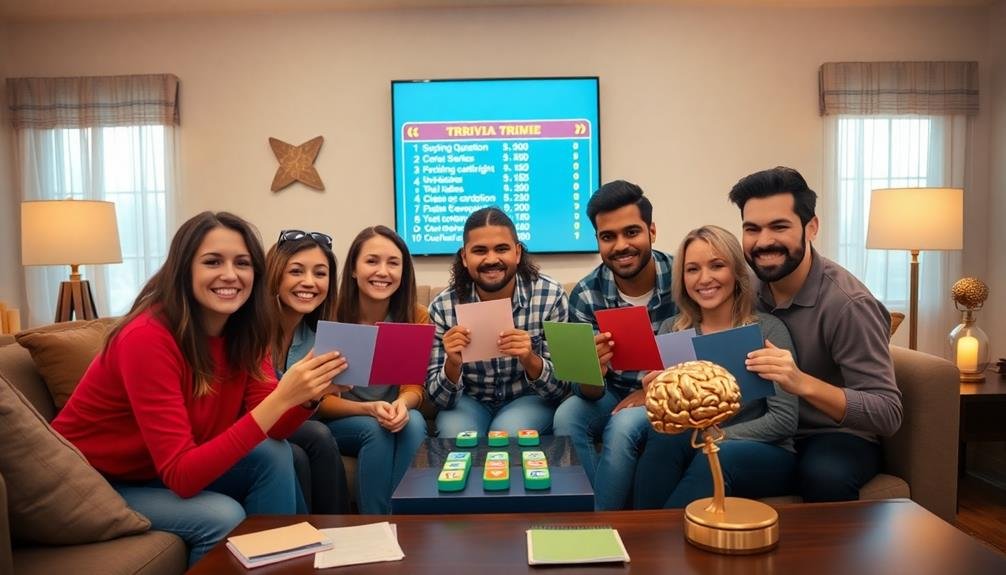
Shifting from the strategic domain of chess, trivia games offer another excellent avenue for managing social anxiety. They provide a structured environment where you can engage with others while focusing on shared knowledge rather than personal interactions.
You'll find that trivia games can help you build confidence and improve social skills in a low-pressure setting.
When participating in trivia games, you'll experience several benefits:
- Enhanced cognitive function: Recalling facts and information stimulates your brain, improving memory and mental agility.
- Increased social interaction: You'll naturally engage in conversations about the topics at hand, fostering connections with others.
- Reduced anxiety: The focus on external information shifts attention away from self-consciousness, easing social discomfort.
To get started, join a local pub quiz or organize a trivia night with friends. You can also explore online trivia platforms to practice in a more comfortable setting.
As you become more familiar with the format, you'll likely find yourself more at ease in social situations. Remember, the goal isn't to know everything but to enjoy the process of learning and connecting with others through shared knowledge.
Escape Room Challenges
While trivia games offer mental stimulation through knowledge recall, escape room challenges take brain-boosting to a whole new level. These immersive experiences require you to think critically, solve puzzles, and work collaboratively under time pressure. For those with social anxiety, escape rooms provide a structured environment to practice communication and teamwork skills.
As you navigate through an escape room, you'll encounter various cognitive challenges that engage different parts of your brain. Here's how escape rooms can benefit your mental abilities and social skills:
| Cognitive Skill | Social Skill |
|---|---|
| Problem-solving | Communication |
| Spatial awareness | Teamwork |
| Logical reasoning | Leadership |
| Memory | Conflict resolution |
| Time management | Active listening |
Frequently Asked Questions
Can Brain-Boosting Games Replace Professional Treatment for Social Anxiety?
No, brain-boosting games can't replace professional treatment for social anxiety. While they may help improve cognitive skills, they don't address the root causes of your anxiety. You should seek professional help for effective, tailored treatment options.
How Long Should One Play These Games Daily for Noticeable Results?
You'll likely need to play consistently for several weeks to see results. Aim for 15-30 minutes daily, but don't overdo it. Remember, these games aren't a substitute for professional treatment. Track your progress to gauge effectiveness.
Are There Any Age Restrictions for Using These Games to Combat Anxiety?
You'll find that most anxiety-combating games don't have age restrictions. They're suitable for all ages, from kids to seniors. However, it's best to consult a mental health professional for personalized advice on using these tools effectively.
Can Playing These Games in Groups Help Improve Social Skills?
Yes, playing games in groups can definitely boost your social skills. You'll practice communication, teamwork, and reading social cues. It's a fun way to interact with others and build confidence in social situations. Give it a try!
Are There Specific Brain-Boosting Games Designed Exclusively for Social Anxiety Sufferers?
Yes, there are games designed specifically for social anxiety sufferers. You'll find apps like Mighty and Joyable that offer tailored exercises. They're not traditional games, but they use game-like elements to help you build social confidence.
In Summary
You've now got a great selection of brain-boosting games to help tackle social anxiety. Remember, it's not just about playing; it's about challenging yourself and growing. As you engage with these puzzles and games, you're building confidence and sharpening your mind. Don't be afraid to start small and work your way up. With practice, you'll find yourself feeling more capable and less anxious in social situations. Keep at it, and you'll see the difference!

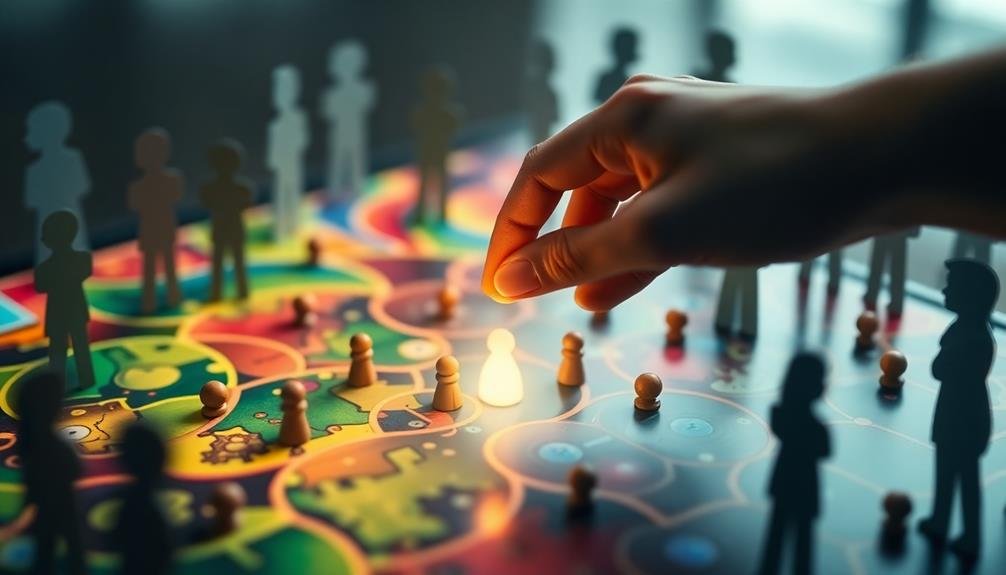
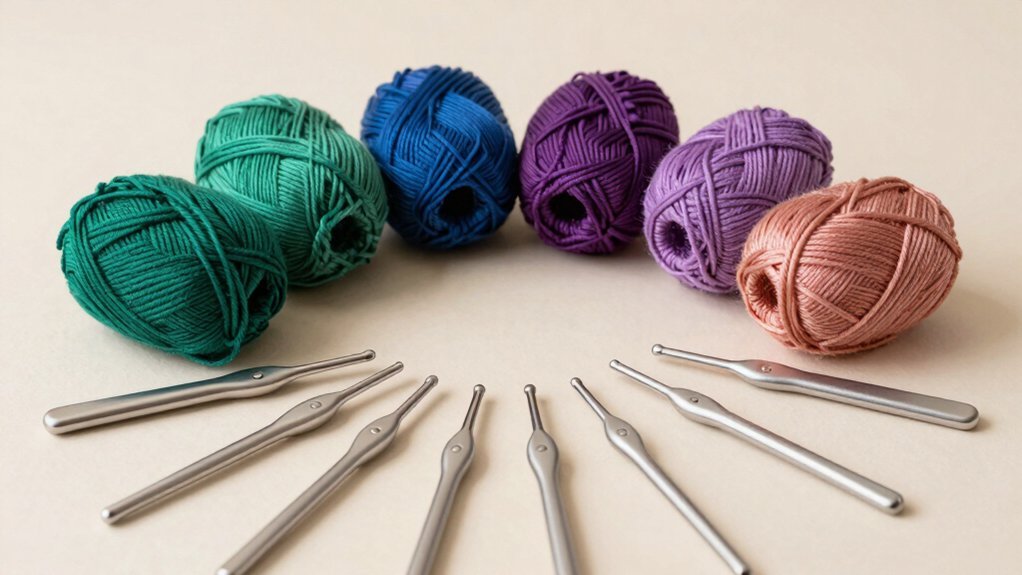
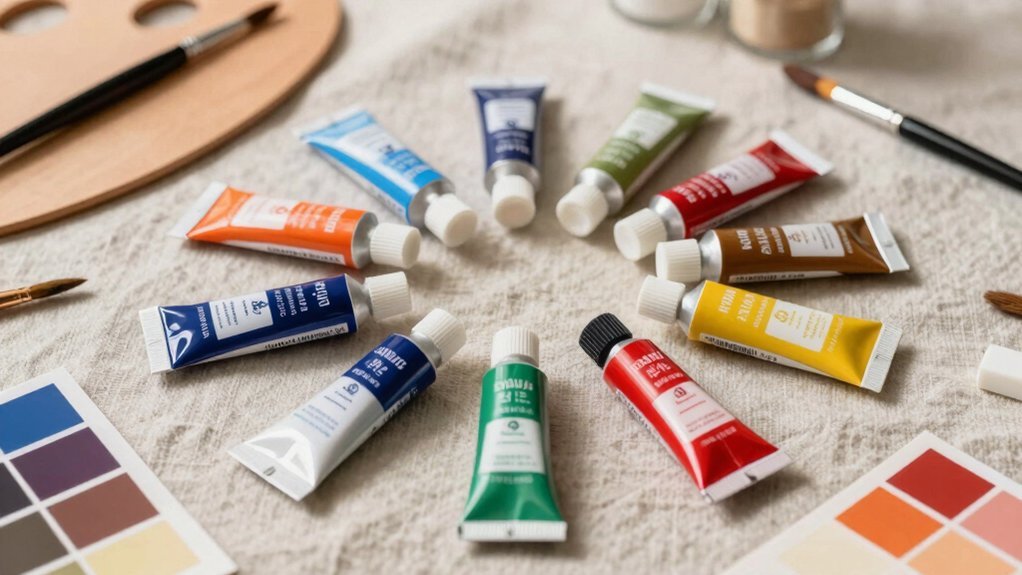
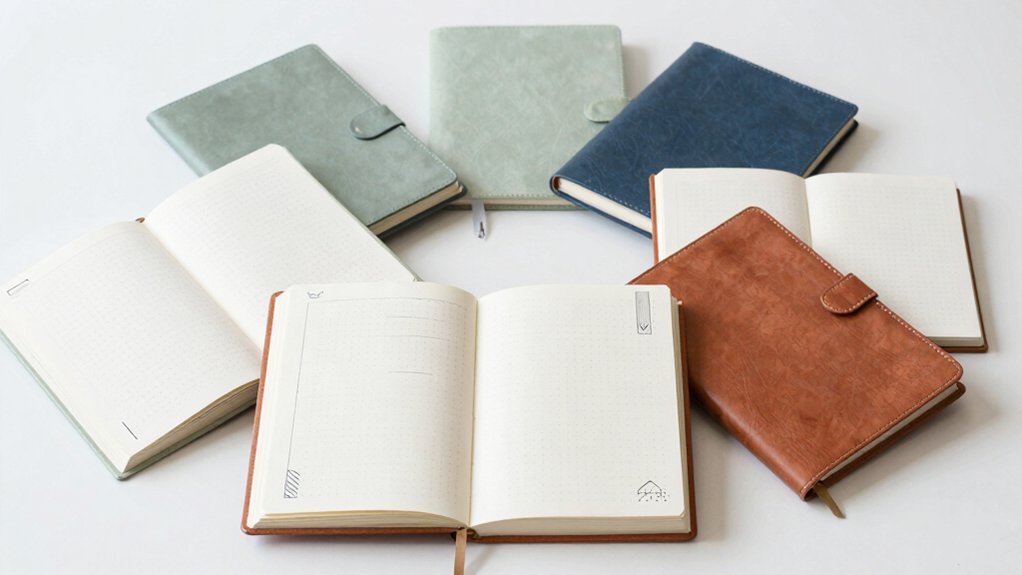
Leave a Reply